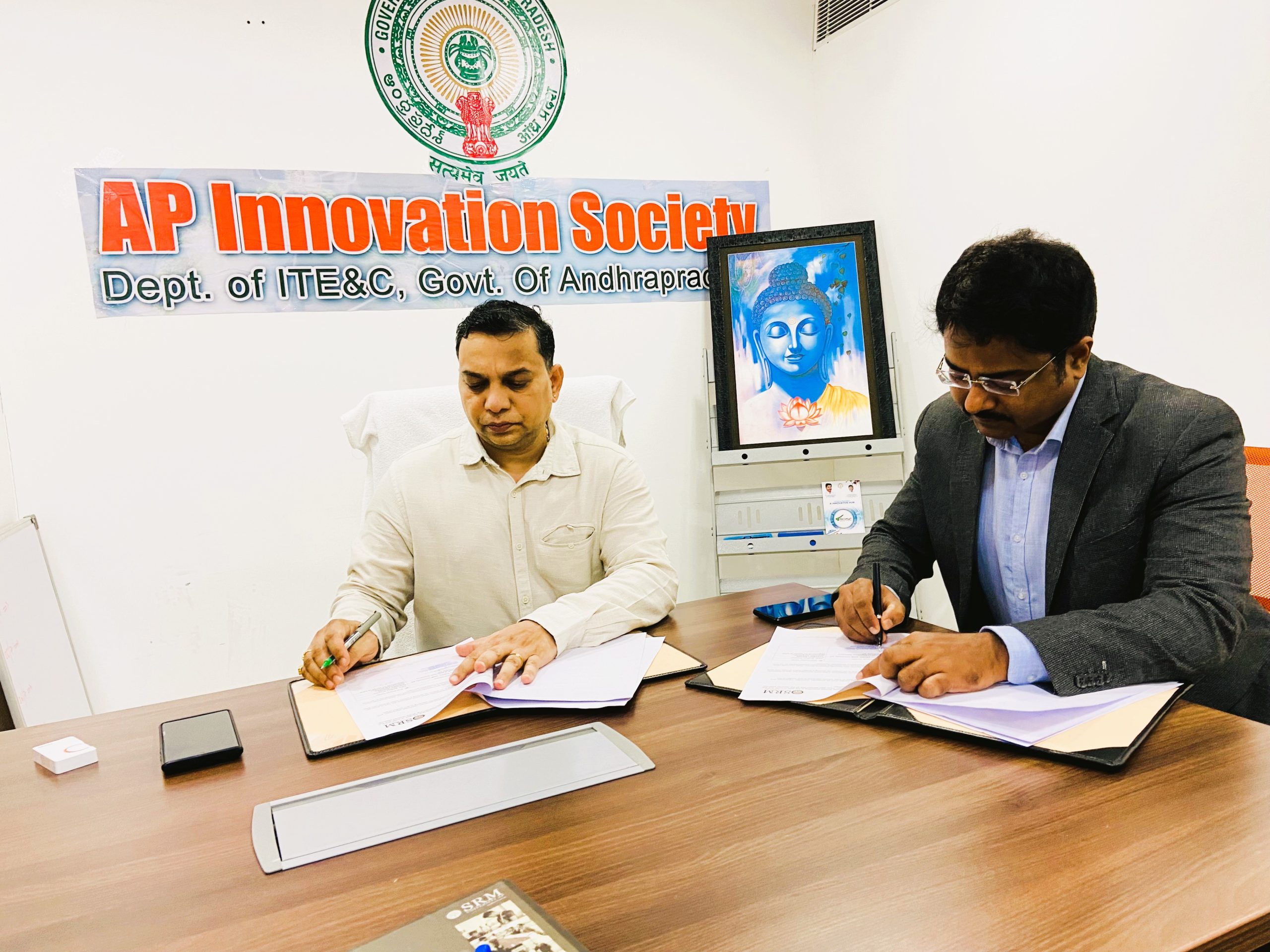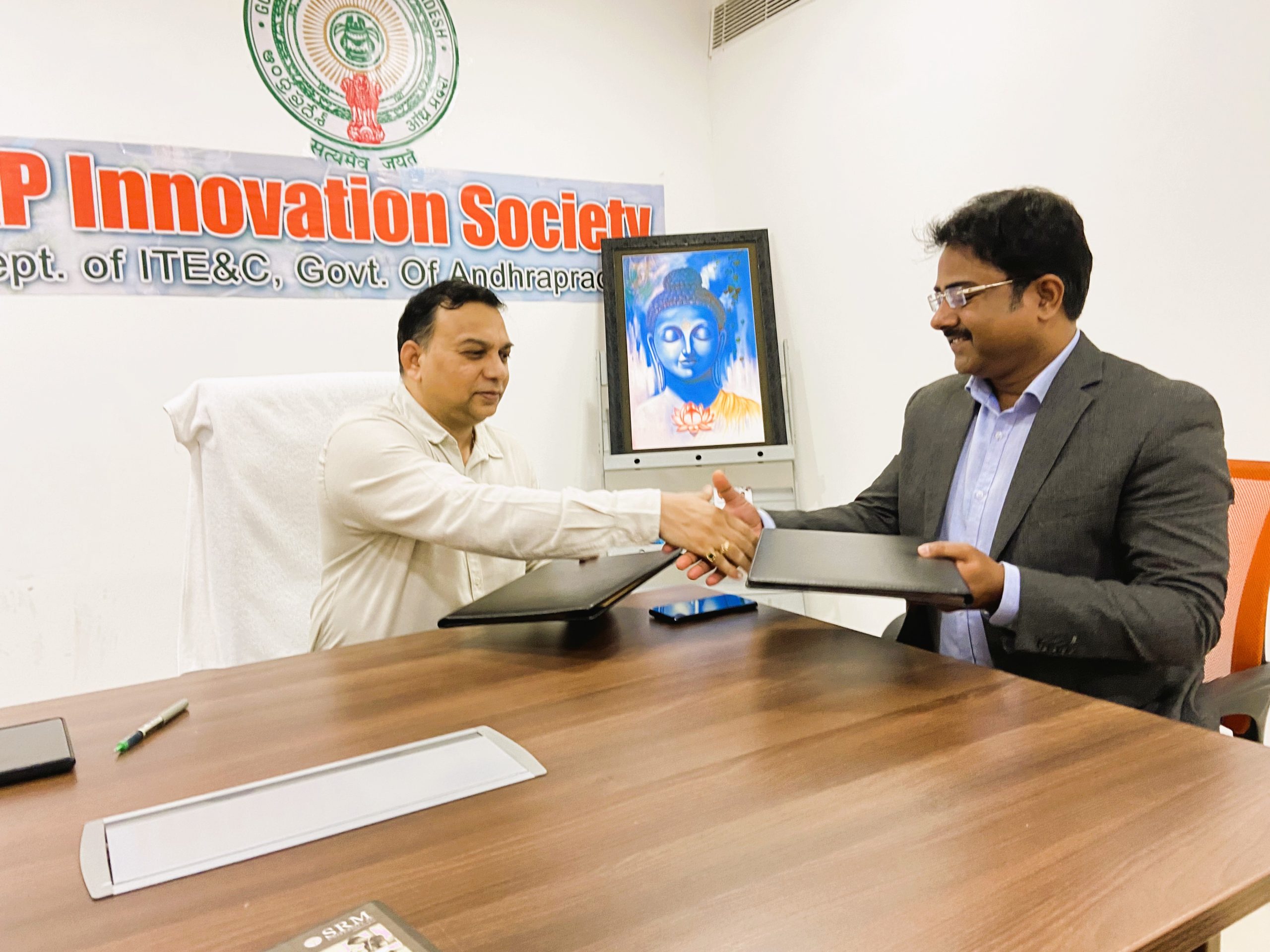All Management Events
- SRMAP Bags Curriculum Design and Development Award July 24, 2023

SRM University-AP was awarded the “Most Promising University for Curriculum Design and Development” at the 2nd Education Leaders and Awards Conclave held in Hyderabad. The award function was organised by Observe Now, a media platform and presented by LinkedIn, under the aegis of the Government of Telangana.
“The award is a testimony to our tireless pursuit of excellence,” said Prof. Manoj K Arora, Vice Chancellor, SRM University-AP. He added that advancement in the education system should be on par with the advancement of technology, the education system cannot afford to fall behind, so the revamped curricula at SRMAP are designed with a futuristic perspective. The curriculum revamp was made taking into consideration the National Education Policy (NEP) guidelines. Industrial experts from across the country were invited for an Industry-Academia Dialogue at SRMAP to deliberate and strategise an industry-relevant curriculum.
Mr Pankaj Belwariar, Director of Communications, SRM University-AP received the award on behalf of the University from Dr Anju Sharma (IAS) Additional Chief Secretary, Labour Department, Government of Gujarat, and Ms. Taniya Tikoo, Editor in Chief, Observe Now.
Continue reading → - Dr Supen Kumar Sah July 17, 2023
- The Benefits of Pursuing an Executive MBA July 14, 2023
Education Jagat
Continue reading →
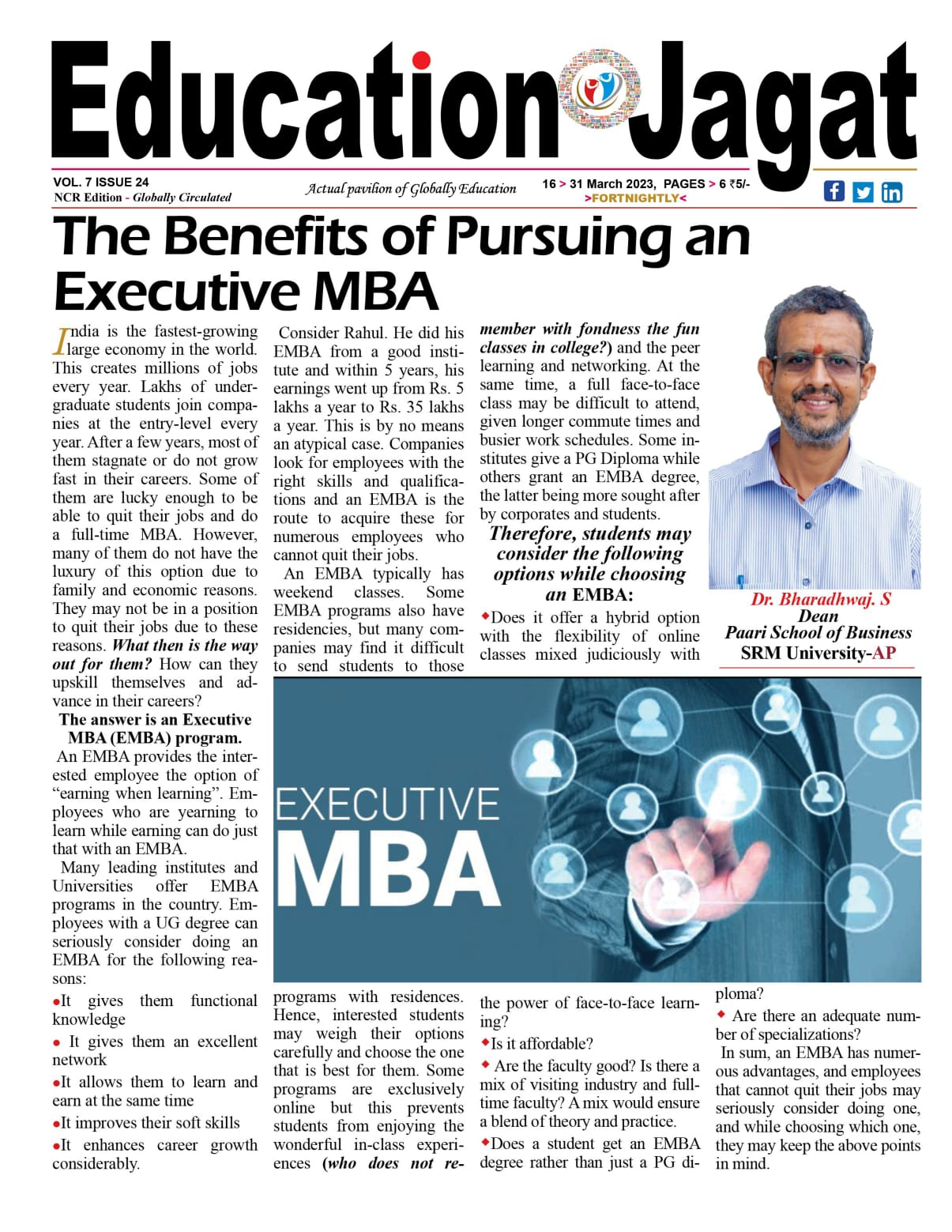
- Cracking the Code: How Congress Scripted Its Victory In 2023 Karnataka Assembly Elections July 14, 2023
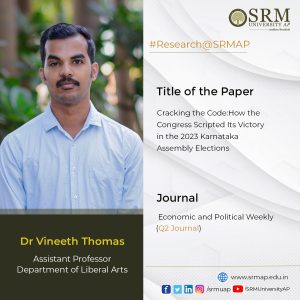 Assistant Professor Dr Vineeth Thomas, from the Department of Liberal Arts, has recently made a publication in the Q2 journal called Economic and Political Weekly. The paper titled Cracking the Code: How Congress Scripted Its Victory In 2023 Karnataka Assembly Elections contributes to comprehending and examining the political landscape of Karnataka, shedding light on the various elements that shape voter behaviour and election outcomes within the context of Indian democracy.
Assistant Professor Dr Vineeth Thomas, from the Department of Liberal Arts, has recently made a publication in the Q2 journal called Economic and Political Weekly. The paper titled Cracking the Code: How Congress Scripted Its Victory In 2023 Karnataka Assembly Elections contributes to comprehending and examining the political landscape of Karnataka, shedding light on the various elements that shape voter behaviour and election outcomes within the context of Indian democracy.Abstract
The Congress party secured a much-awaited thumping majority in the 2023 Karnataka Assembly elections. The election result gave a much-required lifeline to the existential crisis faced by the Congress party and opened the eyes of the BJP to recognise that the Modi-factor and Hindutva card does not always get converted into votes. In this context, this article provides an in-depth analysis of the factors that led to the Congress party’s victory in the 2023 Karnataka assembly elections.
Explanation of the Research in Layperson’s Terms
Due to multiple reasons, it is worth examining the ingredients of Congress’ magical recipe for winning the Karnataka assembly elections. The Congress’ victory in the Karnataka assembly elections in 2023 is a significant political event, as it marked the party’s return to power in the state after a gap of several years. The result provided a new lease of life for the Indian National Congress and it helped to cement the Congress’ position as a key player in the politics of southern India in general and Karnataka in particular. The victory boosts the spirit of Congress party workers on the ground, who are so used to losing that they sometimes give up before the combat even begins. It also allows the party to generate resources in a situation where the Congress controls only three additional states (Himachal Pradesh, Rajasthan and Chhattisgarh). It also enhances the Congress’s profile within the greater national opposition and may persuade some other parties, who have been sceptical of the party’s political judgement and ability, to consider working together. It may help the Congress, which won only one Lok Sabha seat in Karnataka in 2019, to increase its score in 2024. Understanding the components of the Congress’ electoral strategy in Karnataka might therefore provide light on the party’s overall approach to the future assembly and Lok Sabha elections. Examining the reasons that influenced the Congress’ win in Karnataka can give useful insights into India’s larger political scene and shed light on the anticipated outcomes of future elections in the nation.
Continue reading → - Dr Uma Sankararao Varri July 14, 2023
- Dr Shekhar Singh Negi July 14, 2023
- MoU with APIS Opens Doorway to Entrepreneurial Ecosystem July 13, 2023
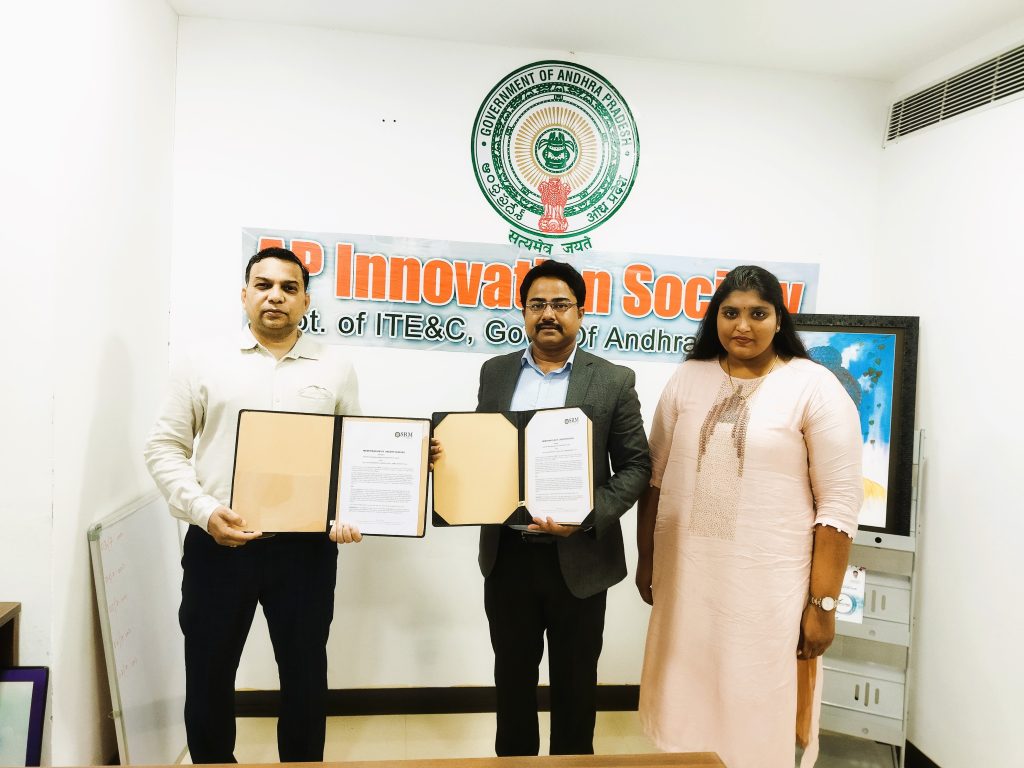
It is a moment of immense pride for SRM University-AP and its entrepreneurial affiliate, the HatchLab Research Centre as they sign an MoU with the Andhra Pradesh Innovation Society (APIS).
HatchLab Research Centre is an innovation and start-up incubator of SRMAP, while APIS is a State Nodal Agency that promotes the growth of innovation, entrepreneurship, and the startup ecosystem in the state. The MoU signed by the two organisations will significantly impact innovations and benefit hundreds of individuals. Also, through this collaboration, the varsity aims to cultivate an environment that nurtures creativity, fosters entrepreneurship, encourages innovative thinking, and drives tangible results. The combined expertise and vision of APIS and HatchLab Research Centre will undoubtedly lead to groundbreaking advancements in various fields, pushing boundaries, unlocking new possibilities, and making a lasting difference.
- Patent Filed for Person Identification System and Method July 13, 2023
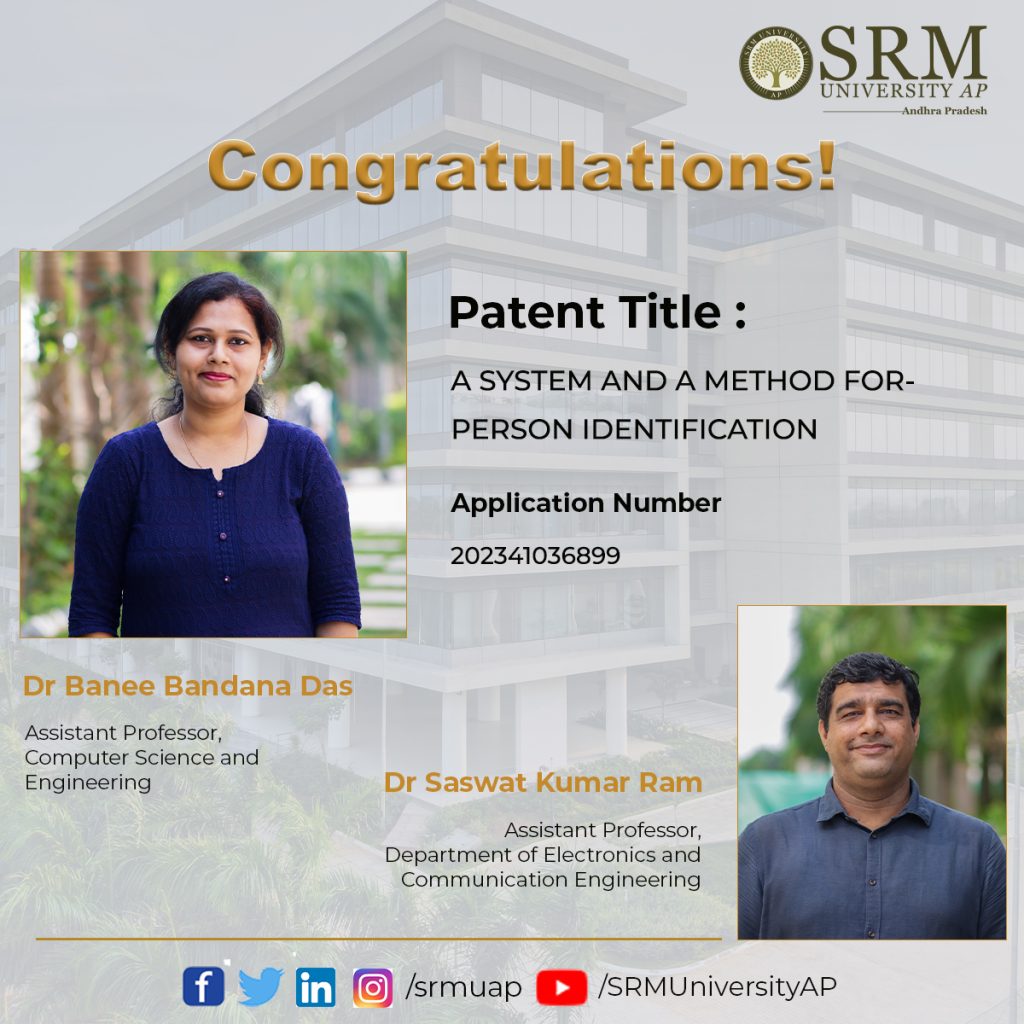
Today, biometric systems are widely used across all major domains, but alarmingly these systems are vulnerable to various security attacks. However, Dr Banee Bandana Das and Dr Saswat Kumar Ram, Assistant Professors at the Department of Computer Science and Engineering, SRM University-AP, have jointly come up with a solution that is more efficient and robust. The faculty duo have also filed and published the patent titled- “A System and A Method For Person Identification” with Application Number: 202341036899.
Abstract
Biometric representation of humans deal with tasks such as identification and verification. It can be done through various methods like fingerprint, face, retina, voice, etc. However, existing biometric systems are vulnerable to various security attacks. EEG-based biometrics are putting forward solutions because of their high-safety capabilities and handy transportable instruments. Motor imagery EEG (MI-EEG) is a broadly centred EEG signal exhibiting a subject’s motion intentions without actual actions. This invention proposes an unsupervised framework for feature learning based on autoencoders. It learns sparse feature representations for EEG-based person identification. Autoencoder-CNN exhibits the person identification task for signal reconstruction and recognition. The framework proved to be a practical approach in managing the massive volume of EEG data and identifying the person based on their different tasks in resting state. The experiments have been conducted on the standard publicly available Motor imagery EEG dataset with 109 subjects. This invention proposes an unsupervised framework for feature learning based on autoencoder to learn sparse feature representations for EEG-based person identification. Autoencoder and CNN do the person identification task for signal reconstruction and recognition. The outcomes imply that the implementation of an autoencoder-CNN architecture for person identification was intensely successful with improved recognition performance with the most notable autoencoder architecture. Eye open and closed resting state data as training data is used while four different motor imagery tasks have been considered test data in this biometric model. Training and testing of different state data of the same person have been proved to be the most robust and versatile EEG-based biometric system.
Practical Implementation of the Research
The present invention can be used in smart city applications, considering that the population of cities is increasing by the day, in which case, the security and privacy of people are at high risk in all sectors. The application of this technology will be in areas like:
Smart Office
The workflow and working efficiency of the employees can be enhanced with various innovative features and technology in an intelligent environment like smart offices of smart cities. Biometric-based methods involving fingerprints, retina, voice, and face recognition for secure authentication and identification of employees, clients, and different types of machinery are helpful. Various security attacks are the most severe issue related to these methods. Brain signals (EEG) are more secure and difficult to copy and steal, efficiently used for security needs and authentication.Smart Healthcare
The laboratory and the data related to the health sectors are always important. The privacy and restricted access are must to secure it. By using the proposed invented model, the security can be enhanced as compared to the traditional biometric traits.Smart Defence
The use of biometric in defence is not discussed in public but is undoubtedly an essential parameter in this domain. Many countries rely on biometric data like faces, irises, fingerprints, etc., for identification. A unique and trusted database is a must in defence for identifying persons involved in various operations. These include authenticating scientists, pilots, engineers etc., and to identify criminals in specific places. EEG-based person identification can be a secure alternative in this domain.As a future prospect, Dr Das and Dr Ram are planning to develop a more secure and reliable biometric authentication system that will be based on Multimodal Techniques using Machine learning Methods.

Continue reading →
- Prof. Manoj Kumar Arora July 13, 2023
- Dr Animesh Bhandari July 12, 2023


